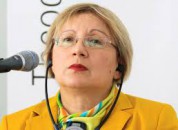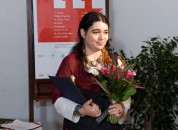Human Rights
Polish Prize of Sérgio Vieira de Mello, UN High Commissioner for Human Rights
Awarded to individuals and non-governmental organizations for their efforts to promote peaceful coexistence and cooperation among societies, religions and cultures.
Winners of the 11th edition of the Award:
 Leyla Yunus (1955)– imprisoned Azerbaijani social activist, leader of the Institute for Peace and Democracy during the Nagorno-Karabakh conflict. She was the head of the Information and Analysis Department in the Azerbaijani Ministry of Defence, in the rank of colonel. She left after Heydar Aliyev’s coup. In 1995, she set up the Institute for Peace and Democracy, which since 2003 has operated Women’s Crisis Centre for victims of family violence. The main areas of the institute’s operation are fight against human trafficking, struggle for the rights of the forcibly evicted, and activity in support of political prisoners independent of their political or religious affiliation. Author of numerous reports on political prisoners. For years she has been the focus of a media hatred campaign: accused of Armenian genes, and unbecoming behaviour while working for the Ministry of Defence. Recipient of the Teodor Haecker Award, she is Knight of the Legion of Honour of France, and has been shortlisted for Sakharov Prize (2014). On 28th April this year, she was detained together with her husband in Baku Airport, before a planned trip to a conference organised by the EED in Brussels. Without a court verdict or a prosecutor’s injunction, the couple’s passports were confiscated, rendering their departure from the country impossible, moreover, searches were made in the office of the Institute for Peace and Democracy and in the couple’s private home. Arrested together with her husband, Arif Yunus, she has been in prison without access to the essential medical aid and possibility of contacting the family. Her detention was condemned by the government of the United States and the leading world organisations supporting human rights.
Leyla Yunus (1955)– imprisoned Azerbaijani social activist, leader of the Institute for Peace and Democracy during the Nagorno-Karabakh conflict. She was the head of the Information and Analysis Department in the Azerbaijani Ministry of Defence, in the rank of colonel. She left after Heydar Aliyev’s coup. In 1995, she set up the Institute for Peace and Democracy, which since 2003 has operated Women’s Crisis Centre for victims of family violence. The main areas of the institute’s operation are fight against human trafficking, struggle for the rights of the forcibly evicted, and activity in support of political prisoners independent of their political or religious affiliation. Author of numerous reports on political prisoners. For years she has been the focus of a media hatred campaign: accused of Armenian genes, and unbecoming behaviour while working for the Ministry of Defence. Recipient of the Teodor Haecker Award, she is Knight of the Legion of Honour of France, and has been shortlisted for Sakharov Prize (2014). On 28th April this year, she was detained together with her husband in Baku Airport, before a planned trip to a conference organised by the EED in Brussels. Without a court verdict or a prosecutor’s injunction, the couple’s passports were confiscated, rendering their departure from the country impossible, moreover, searches were made in the office of the Institute for Peace and Democracy and in the couple’s private home. Arrested together with her husband, Arif Yunus, she has been in prison without access to the essential medical aid and possibility of contacting the family. Her detention was condemned by the government of the United States and the leading world organisations supporting human rights.
Category: Organization
 Amalipe Centre for Interethnic Dialogue and Tolerance is a leading Bulgarian organisation working for the equal rights and integration of the Roma in Bulgarian society. The organisation chiefly supports intercultural education and integration through education. Amalipe cooperates with over 250 schools in Bulgaria, trying to counteract dropping out of Roma children from education prematurely. It also becomes involved in initiatives related to health protection and prevention of contagious diseases, and runs a network of the so-called “health mediators” supporting people of Roma origin in access to and use of healthcare. The organisation carries out campaigns in support of including Roma issues into state policies, notably the Human Capital Operational Programme. In 11 Bulgarian communes, Amalipe has developed Community Development Centres and local clubs. These institutions motivate the Roma to continue education, support violence and early marriage prevention, and helped to build civil identity. For years, the centre has furthered increasing the level of tolerance of the Roma in Bulgarian society, with the range of means including festivals of Roma culture and information campaigns. The organisation is a member of the Civic Council by the Bulgarian Ministry of Education and Science, National Network for Children, European Women’s Lobby, and many other institutions and public councils.
Amalipe Centre for Interethnic Dialogue and Tolerance is a leading Bulgarian organisation working for the equal rights and integration of the Roma in Bulgarian society. The organisation chiefly supports intercultural education and integration through education. Amalipe cooperates with over 250 schools in Bulgaria, trying to counteract dropping out of Roma children from education prematurely. It also becomes involved in initiatives related to health protection and prevention of contagious diseases, and runs a network of the so-called “health mediators” supporting people of Roma origin in access to and use of healthcare. The organisation carries out campaigns in support of including Roma issues into state policies, notably the Human Capital Operational Programme. In 11 Bulgarian communes, Amalipe has developed Community Development Centres and local clubs. These institutions motivate the Roma to continue education, support violence and early marriage prevention, and helped to build civil identity. For years, the centre has furthered increasing the level of tolerance of the Roma in Bulgarian society, with the range of means including festivals of Roma culture and information campaigns. The organisation is a member of the Civic Council by the Bulgarian Ministry of Education and Science, National Network for Children, European Women’s Lobby, and many other institutions and public councils.
